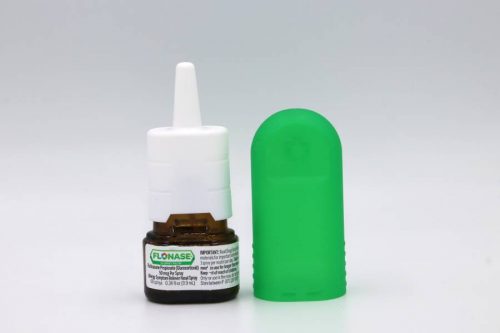We use nasal sprays to relieve congestion. Congestion is an accumulation of fluid in the nose.
This fluid can cause the lining of the nose to swell and makes it difficult to breathe.
Nasal sprays work by shrinking the blood vessels in the nose. This allows the fluid to drain and the airways to open up.
There are several types of nasal sprays available.
In this article, we are going to talk about two types of decongestants, which are Afrin and Flonase, and the differences between them.
| Afrin | Flonase |
| Short-acting medicine | Long-acting medicine |
| Starts to work immediately | Starts to work gradually |
| It works by reducing flow of fluids | It works by reducing inflammation |
| Available as over-the-counter medicine. | Available as over-the-counter, and prescription |

The most common are decongestants, which shrink the blood vessels in the nose and allow the fluid to drain.
There are also antihistamines, which help to reduce the inflammation in the nose, and corticosteroids, which help to reduce the inflammation and the production of mucus.
Read on to know more about the key distinctions!
Afrin and Flonase are both nasal sprays used to treat congestion and other symptoms of allergies and the common cold. Afrin has the generic name of oxymetazoline, while Flonase’s generic name is fluticasone propionate. They both are medications that help clear the nasal passages.
However, there are a few things that are different between the two drugs.
Afrin is a short-acting decongestant, which means that it starts to work immediately but only lasts for up to 12 hours. Flonase is a long-acting decongestant, which means that it starts to work gradually but lasts for up to 24 hours.
Afrin is more expensive than Flonase and is more likely to cause rebound congestion, which is when the congestion gets worse after the drug is stopped. Flonase is less likely to cause rebound congestion.
Afrin can cause a burning sensation in the nose, while Flonase does not. Afrin is available as over-the-counter medicine.
Doctors may also prescribe Afrin or Flonase to treat nasal allergies. These medications can help to relieve symptoms such as sneezing, runny nose, and itchy eyes.
Afrin and Flonase are both safe and effective when used as directed. Treatment using Afrin usually takes 3 to 5 days, while for Flonase usually lasts for several days or even months.
Longer usage of Afrin can cause a number of side effects, including rebound nasal congestion and dry nose. On the other hand, Flonase is typically safe to be used for a longer term, though the side effects are much more varied, including headache, nosebleed, and nausea.





